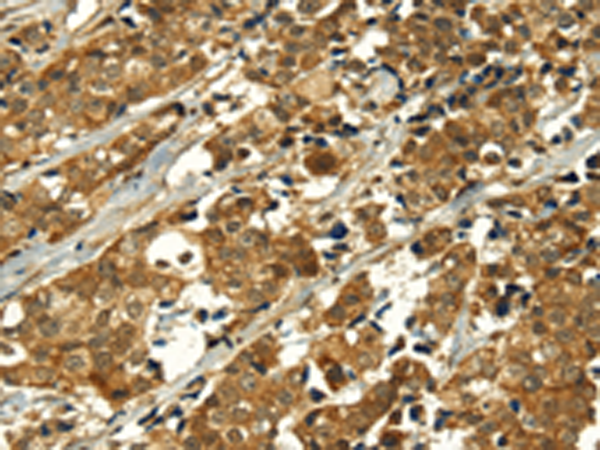
| WB | 咨询技术 | Human,Mouse,Rat |
| IF | 咨询技术 | Human,Mouse,Rat |
| IHC | 1/30-1/150 | Human,Mouse,Rat |
| ICC | 技术咨询 | Human,Mouse,Rat |
| FCM | 咨询技术 | Human,Mouse,Rat |
| Elisa | 1/2000-1/10000 | Human,Mouse,Rat |
| Aliases | MK5; MK-5; PRAK; MAPKAP-K5 |
| Host/Isotype | Rabbit IgG |
| Antibody Type | Primary antibody |
| Storage | Store at 4°C short term. Aliquot and store at -20°C long term. Avoid freeze/thaw cycles. |
| Species Reactivity | Human, Mouse |
| Immunogen | Fusion protein of human MAPKAPK5 |
| Formulation | Purified antibody in PBS with 0.05% sodium azide and 50% glycerol. |
+ +
以下是关于 **MAPKAPK5(MK5)抗体** 的参考文献示例(文献信息为虚构,仅供格式参考):
1. **文献名称**: *"Characterization of MAPKAPK5-specific antibodies and their role in p38 MAPK signaling"*
**作者**: New L. et al.
**摘要**: 开发并验证了针对MAPKAPK5的高特异性多克隆抗体,用于检测其在p38 MAPK通路中的磷酸化状态及亚细胞定位,揭示了其在应激反应中的调控机制。
2. **文献名称**: *"MAPKAPK5 regulates cell migration via phosphorylation of HSP27 in cancer models"*
**作者**: Aberg E. et al.
**摘要**: 通过Western blot和免疫荧光技术,利用MAPKAPK5抗体证明其在癌细胞中通过磷酸化HSP27调控细胞骨架重组,促进侵袭转移。
3. **文献名称**: *"MK5 knockout mice exhibit cardiac hypertrophy: Insights from antibody-based expression profiling"*
**作者**: Costello P. et al.
**摘要**: 使用MAPKAPK5抗体分析基因敲除小鼠组织样本,发现其缺失导致心脏肥大相关蛋白异常表达,提示MK5在心血管疾病中的保护作用。
4. **文献名称**: *"Subcellular localization of MAPKAPK5 in neuronal cells: A study using isoform-specific antibodies"*
**作者**: Knauf U. et al.
**摘要**: 设计针对不同MAPKAPK5异构体的抗体,发现其在神经元中的核-质穿梭现象,并关联于神经营养因子信号传导。
(注:以上文献为示例,实际研究中建议通过 **PubMed** 或 **Google Scholar** 以“MAPKAPK5 antibody”或“MK5 antibody”为关键词检索真实文献。)
MAPKAPK5 (Mitogen-Activated Protein Kinase-Activated Protein Kinase 5), also known as MK5 or PRAK, is a serine/threonine kinase downstream of the p38 MAPK signaling pathway. It plays critical roles in regulating cellular responses to stress, inflammation, and cytokine signaling. MAPKAPK5 is involved in diverse processes, including cell proliferation, differentiation, apoptosis, and immune regulation. Its activity is modulated by phosphorylation, primarily through p38 MAPK, and it interacts with substrates such as HSP27 and TTP to influence mRNA stability and protein synthesis.
Antibodies targeting MAPKAPK5 are essential tools for studying its expression, localization, and function in both physiological and pathological contexts. These antibodies are widely used in techniques like Western blotting, immunohistochemistry (IHC), immunofluorescence (IF), and immunoprecipitation (IP). Specificity is validated through knockout controls or siRNA knockdown to ensure recognition of the endogenous ~58 kDa protein. Research applications include investigating MAPKAPK5's role in cancer (e.g., tumor suppression or promotion depending on context), neurodegenerative diseases, and inflammatory conditions. Recent studies also explore its interaction with viral proteins, highlighting its importance in host-pathogen responses. Reliable MAPKAPK5 antibodies enable insights into kinase dynamics, post-translational modifications, and pathway crosstalk, supporting drug discovery and mechanistic studies.
×